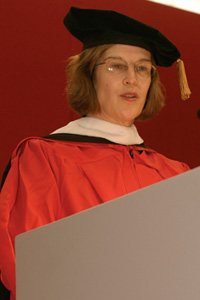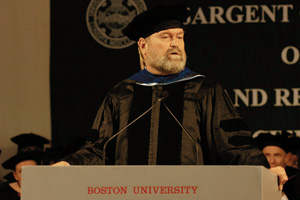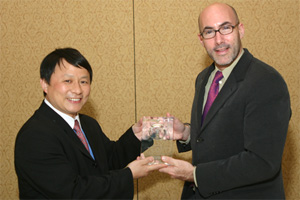 |
|
||
|
|||
I’ve been there
Conovocation speakers share life lessons learned firsthand
By David J. Craig, Jessica Ullian, and Brian Fitzgerald
Following are highlights from speeches by some of the government officials, journalists, scientists, and community leaders who offered their insights to graduates at Convocation ceremonies and at the University’s Baccalaureate service on May 22.
John F. Kerry, U.S. senator
MED Convocation
“We have the best health care in the world, but ironically the system in which it’s delivered is increasingly coming apart,” said U.S. Senator John F. Kerry (D-Mass.). “The bottom line is the system remains broken because, frankly, we have a bad habit in America: the government only responds to those . . . who wield power through influence, not substance.”
Power politics, Kerry argued, are partly to blame for several challenges facing our health-care system: 45 million Americans have no health insurance, in part because insurance and drug industry lobbies make sure no serious changes are made to the health-care system, and medical advances that could result from stem cell and nanotechnology research are impeded by conservative ideologues.
Kerry implored the MED graduates to join grassroots efforts to educate the American public about these and related issues. “It shouldn’t be hard to connect the dots for the American people,” he said. “And it shouldn’t be hard to get them mad about what’s happening. . . . Fixing our health-care system as a whole is our primary challenge, and to make it happen you need to get engaged — to pound the pavement, get your hands dirty, endure real sacrifice, take on antiquated thinking, and help lead the public debate.”
Policymakers can hear “from special interests on these issues, or from you,” continued last year’s Democratic challenger to President Bush. “By becoming doctors you have won a very special position in our society. When you leave today you will have the credibility to challenge Washington. . . . My message to you is: Use it. Live up to the special position you’ve been granted.”
A. Elizabeth Jones, assistant secretary of state for European and Eurasian affairs
MET Convocation
|
|
Elizabeth Jones Photo by Linda Hass |
|
In her 35 years as a diplomat, A. Elizabeth Jones has assisted in negotiations between Egyptian and American ambassadors, helped plan economic reforms in the former Soviet Union, and lived in Cairo at a time when the United States had no diplomatic relations with most Arab countries. The experiences, she said, have taught her a fundamental lesson about life: “Don’t be a jerk.”
“I must concede upfront, there are people in this world who seem to have found success without embracing this message,” Jones (GRS’86) said at the convocation ceremonies for Metropolitan College. But “ultimately, your life, both personal and professional, is fundamentally about relationships. I can certainly give you very sage advice about the Foreign Service, about the rewards of government service, about the excitement of living and working overseas. But whatever career we turn to, whatever job we accept, I believe there are some universal lessons that apply to assuring success — personal and professional. . . . The way you choose to treat your colleagues, peers, and subordinates represents the single greatest determinant of your future success.”
The importance of personal relationships, Jones said, became clear to her in 1973, when she was working for the State Department in Cairo. The Yom Kippur War had just begun, and Secretary of State Henry Kissinger had come to Egypt to meet with President Anwar Sadat. After the meeting, she asked a member of Kissinger’s staff what had happened. “The most important thing that happened today was they liked each other,” he replied. “The rest is easy.”
“It was at that moment that a big light went on for me,” said Jones. “Had these two people not connected, the outcome of those talks would have undoubtedly been very different, and consequently the world more dangerous than it was.”
Today, she said, tolerance is often replaced by self-righteousness, and public figures are praised for diatribes instead of criticized for “chilling our heritage” of civil discourse. “The more you demonstrate respect for all the people in your organization,” she said, “from the parking garage attendant to your office manager to your boss to your colleague down the hall, the more you empower them, the more they, in turn, empower you.”
David Aronson, painter and a school of visual arts founder
CFA Convocation
Upon leaving the “idyllic” creative atmosphere of the College of Fine Arts, young artists must remember to value their idiosyncratic tendencies and take risks, whether that leads to making great work or periodically “ends in creative disaster,” said David Aronson, addressing CFA graduates.
And American artists must have deep faith in their convictions today more than ever, said the Boston Expressionist painter, who helped found the school of visual arts in the 1950s, because currently our society’s appetite for art is tepid. “Be aware that the line separating true art and popular entertainment grows less and less distinct in this celebrity-intoxicated culture,” he says. “Though the validation of your peers and public recognition are very welcome rewards, the real security lies in your belief in yourself, the values you uphold, and the essence of what you accomplish.”
To develop fully, CFA graduates must remember to remain attuned forever to “the Great Ghosts of Art. They will be there to instruct and inspire you whenever you need them,” he said. “Bach, Debussy, Michelangelo, de Kooning, Shakespeare, and Chekhov will be the constants as your taste, your opinions, and your visions change and develop.”
And finally, “Know that hard work often results in good work,” but don’t “mistrust or reject out of hand what comes easily,” he said. “I remember an artist who could draw and paint from nature like an angel. But he so admired fine abstract paintings, as we all did, that to emulate them he abandoned the thing he did so effortlessly and beautifully. He struggled for years in a lifelong, failed effort to excel in an area for which he was totally unsuited.”
Frederick Berry, Massachusetts state senator
SAR Convocation
|
|
Frederick Berry Photo by Albert L’Étoile |
|
During his 22 years as a Massachusetts state senator, Majority Leader Frederick Berry (D-Peabody) has worked hard to address the everyday bread-and-butter issues facing his constituents. Berry, who was born with cerebral palsy, is also well known as an advocate for the rights of the disabled.
He told Sargent College graduates that when he was born, doctors painted a grim picture of his future. “They told my mother and father that I would never talk or walk or even be able to sit up on my own,” he said. But “because of the love and support of my parents and siblings, I surpassed all expectations . . . in the first five years of my life.”
Berry’s unconditional family love and support were not able to help him in grammar school, however, and he ended up a residential student at the Massachusetts Hospital School, a school for children with severe disabilities.
“This turned out to be one of the formative experiences of my life,” he said. “I was surrounded there by children much more severely disabled than I. For the first time in my life I felt fortunate.”
Berry eventually graduated from Bishop Fenwick High School and Boston College and then served as a VISTA volunteer in Texas. Returning to his hometown of Peabody, he worked as a rehab professional in a workshop for adults with mental retardation before entering politics.
The moral of his story is that “a disability is not always a liability,” he said. “The greater lesson of my life, however, is what can be accomplished when someone believes in you. For me, it started with my family, who always believed in me. When I left Mass Hospital School, it was the new friends that I made at Bishop Fenwick — many of whom remain my closest friends today — who believed in me. When I entered politics, it was the volunteers who believed in me. When I entered the state Senate, it was my colleagues who believed in me. And it is my wife, who from the first day we met has always believed in me. . . .”
“As OTs and PTs and rehab counselors and speech-language pathologists, you have already chosen to believe in people with disabilities,” he said. “Every day you will make a difference in the lives of your patients . . . How you treat people with disabilities will not solve all their problems — I understand that. But the respect you show your patients and the ease with which you interact with them will help them believe in themselves.”
Peter S. Goodman, Washington Post reporter
COM Convocation
|
|
Hugo Shong (COM’87,GRS’90) presents Peter S. Goodman, Shanghai bureau chief and Asian economic correspondent for the Washington Post, with the first annual Hugo Shong Journalist of the Year Award for Reporting on Asian Affairs, after Goodman spoke at COM’s convocation. Shong is a native of China and senior vice president of International Data Group, Inc., the world’s top technology publisher. Photo by Patrice Flesch |
|
The communications professions are “in serious trouble,” said Peter S. Goodman, the Washington Post’s Shanghai bureau chief, in part because of journalists who went soft on the Bush administration in the lead-up to the war in Iraq and those who have created controversy by concocting stories. Meanwhile, he added, television news programs are hamstrung by shrinking budgets, public relations professionals are blamed for helping perpetrate the Enron and other corporate scandals, and advertisers are associated with data collection services “that pry into our private lives.”
What to do? Simple: concentrate on producing “work that is important, that must be read because it offers people information that they need to select good leaders, pursue good policies, run households, enjoy themselves, and go about their lives,” Goodman said. “Work like that will always find a place somewhere. . . .”
To that end, Goodman had practical advice: don’t take for granted the attention of your audience, for starters, and approach the world with skepticism, rather than cynicism.
Goodman, for instance, covered the last years of Suharto’s authoritarian rule in Indonesia in the 1990s, when most of the Western media dismissed as irrelevant street demonstrations there, because he was “naive enough to imagine that change was possible,” he said. “Cynicism is weakness and shallowness dressed up as wisdom. It deadens us to surprise and chokes off creative thinking.”
He also pointed out that learning thoroughly one’s craft takes humility: “As you embark on your careers, you may be tempted to adopt a posture of knowing more than you do,” he said. “Don’t. Otherwise, you will find yourself too busy with a probably futile performance of your mastery to focus on your real mission — learning your craft. Project to your bosses and colleagues precisely who you are: young, eager, and ready to learn, with your enthusiasm and curiosity ample compensation for your lack of experience.”
Shirley Ann Jackson, president of Rensselaer Polytechnic Institute
Baccalaureate address
Half a century ago, the concept of ethics was rarely discussed outside of university philosophy departments, but in twenty-first century America it is analyzed everywhere: in hospitals, in major corporations, even in the press. One reason for the change, said Shirley Ann Jackson, the president of Rensselaer Polytechnic Institute, is that today’s world is “Wi-Fi, hyper-linked, warp-speed, 24-7-365 online,” offering new options but also requiring new, sometimes difficult decisions.
“The need to apply ethical principles to daily issues has not always been as prevalent as it seems today,” said Jackson in her Baccalaureate address at Marsh Chapel on May 22. “This is due in no small measure to an acceleration of possibilities.”
The key to developing a sense of ethics, she said, is to shift one’s focus away from personal gain when conflicts arise, and to reframe each dispute in a way that targets the common good. The environmental effects of scientific development, for example, continually raise new issues that pit human beings against the natural world; much of the technology that improves the lives of human beings causes irreparable damage to the globe and results in species extinction and pollution.
An alternative to framing such debates as problems of “man-against-nature,” Jackson said, is to consider how man is “part of nature,” and thereby examine how humans fit into the ecosystem, assessing the potential damage done to the systems needed for survival.
“Each of the many global conflicts which employ and destroy so much of the world’s resources involve an array of ethical issues, pitting group against group, culture against culture, history against history,” she said. “And yet, global economics, energy security, and geopolitics continually demonstrate the degree to which our collective well-being is interlinked. Recognizing this interconnection may help us find ways to reframe complex issues, to resolve issues, and to work toward the larger good.”
![]()
3
June 2005
Boston University
Office of University Relations


